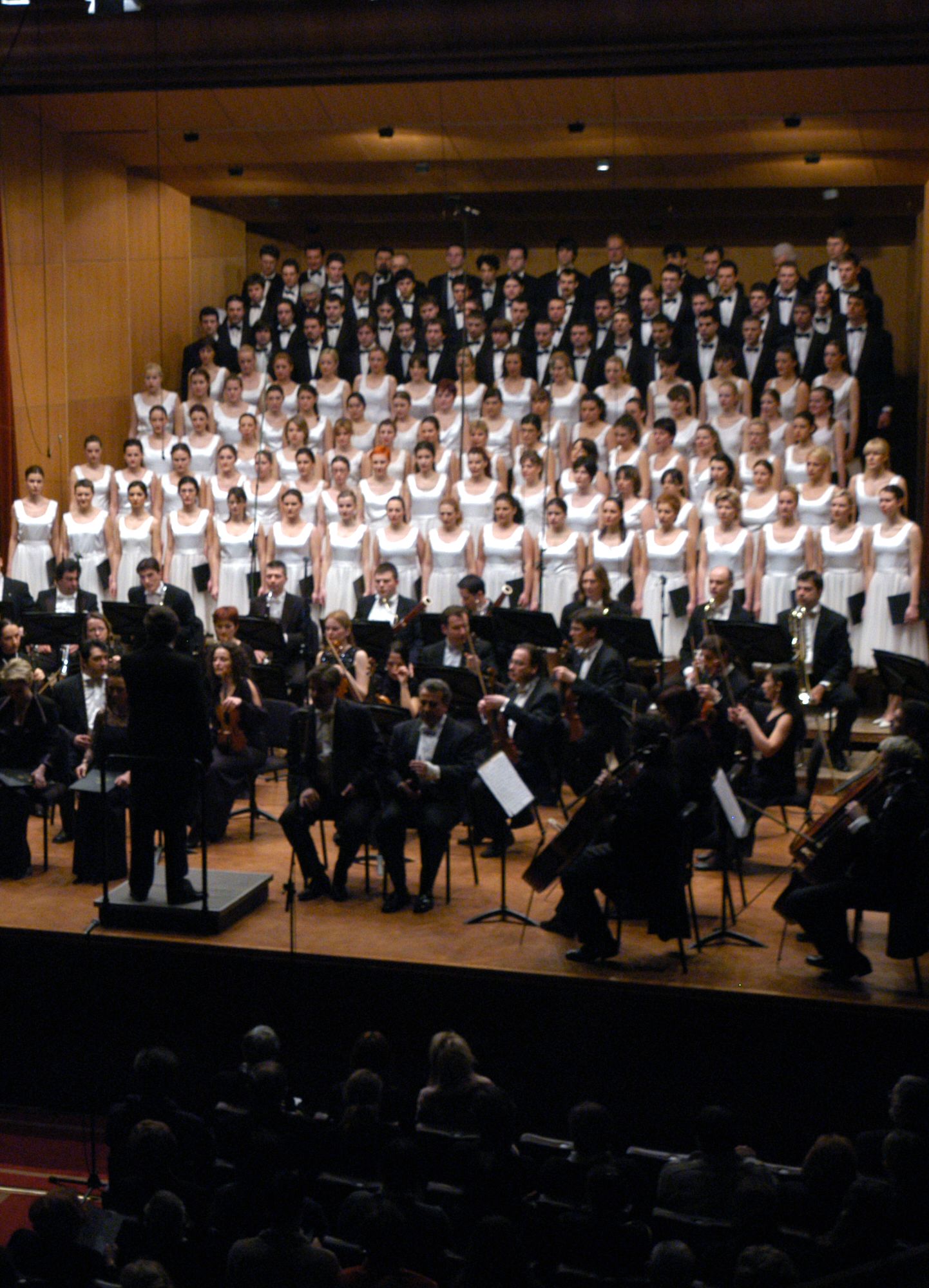Choir Obilić Artistic Society Branko Krsmanović

The choir was established in 1884, at the Belgrade University, under the name The Academic Singing Society “Obilic”. It was conducted by leading composers and conductors of the time, such as Josif Marinkovic, Stanislav Binicki, Jovan Bandur, Lovro von Matacic, Svetolik Pascan, Branko Dragutinovic.
Upon the renewal of its activities in 1945, under the guidance of Maestro Bogdan Babic, the choir (now under the name of AC “Branko Krsmanovic”) became an important factor of the Yugoslav musical production, which is confirmed by a number of important recognitions: the first prizes in Arrezzo, Llangollen, Moscow, Vienna, Munich, the second prize in polyphony in Torrevieja 1997, to name a few.
Since 1981, the director and conductor of the choir is Mme Darinka Matic Marovic, renowned Professor and former Rector of Belgrade University of Arts, who with her great musicianship, energy and enthusiasm led the choir to the highest achievements on the home and world concert stages. Among the greatest successes of the choir are eight three-month tours in the USA and Canada (with over 500 concerts), and the tours in Sweden, Finland, Czechoslovakia, Poland, China, Germany, Austria, Switzerland, Italy, Romania, Bulgaria, Russia, Great Britain, France, Spain (Torrevieja 1997,2006 and Vitoria and Burgos 2003), Hungary, Greece, Mexico etc.
The choir performed in the most famous concert halls of the world: The Carnegie Hall in New York, the Acropolis Opera House in Nice, the Concerthuset in Stockholm, the Tchaikovsky Hall in Moscow, the Berlin Philharmonics, the Los Angeles Philharmonics, the Constitution Hall in Washington, the Herodio Theatre in Athens, Musikverein in Vienna, Piazza del Campidolio in Rome, etc.
The rich repertoire of the choir includes numerous vocal-instrumental, scenic and a cappella religious works, the most important being: Verdi’s Requiem Mass, Mozart’s Requiem Mass, Dvorak’s Requiem Mass, Faure’s Requiem, Cherubini’s Requiem, R. Schuman Requiem, Rossini’s Stabat mater, Dvorak’s Stabat Mater, Poulenc’s Stabat Mater, Carl Orff’s Carmina Burana, Catulli Carmina and Trionfo di Afrodite, Beethoven’s 9th Symphony, Shostakovich’s 13th Symphony, Beethoven’s Missa Solemnis and Mass in C Major, Mozart’s Missa Brevis and Mass in C Major, Rossini’s Missa Solenelle, Cherubini’s Mass in C Major, A. Bruckner’s Te Deum, G. Verdi’s Te Deum, Vivaldi’s Gloria, Mahler’s Symphonies, No. 2, No. 3, No. 5 and No. 8, S. Prokofieff’s “Alexander Nevsky”, Acelen’s “Filius Hominis” (first performance in the St. Ignace Church in Rome), Puccini’s “Messa di Gloria” (for the Celebration of 120th Anniversary of Choir’s activities).
The choir performed operas in concerts: Tchaikovsky’s “Yolanta”, W.A.Mozart’s “Don Giovani”, R. Wagner’s “Parcifal”, S. Rahmaninoff’s “Aleko”, Donizetti’s “Poliuto”, Glinka’s “Ivan Susanin”, Borodin’s “Prince Igor”, Korsakoff’s “Mozart and Salieri”, as well as on stage: Saint Saens’ “Samson and Delilah” at the opening of the Acropolis Opera Hall in Nice, then, Massenet’s “Herodiade”, again in Nice, Verdi’s “Vespre Siciliane”, Verdi’s “Aida”, in Nice, Orange and Montpelier.
On the repertoire are various works of religious orthodox music by Russian, Bulgarian and Serbian composers.
The choir worked with famous orchestras from Serbia, but also with the Geneva Symphony Orchestra, the Orchestra of the Swedish Radio, the Nice Philharmonics, the Santa Cecilia Orchestra in Rome, the Russian National Orchestra, the National Orchestra in Lyon, The National Orchestra in Lille, the Moscow Chamber Orchestra, the Armenian National Orchestra, Roma Symphony Orchestra, etc. and with famous conductors Sixten Ehrling, Jacques de la Cotte, Hans Graf, Lovro von Matacic, Milan Horvat, Emil Chakarov, Evgeni Svetlanov, Cyril Dietrich, Jean-Claude Casadesus, Georges Pretre, Emil Tabakov, Gerhard Track, David Eaton, Ennio Morricone etc.
Among the notable performances in the last few years are the performances in Mexico, Argentina, Bulgaria and Spain. While continuing its activities within the Artistic Association “Branko Krsmanovic”, in 1991 the Choir reassumed its old name “Obilic”.







